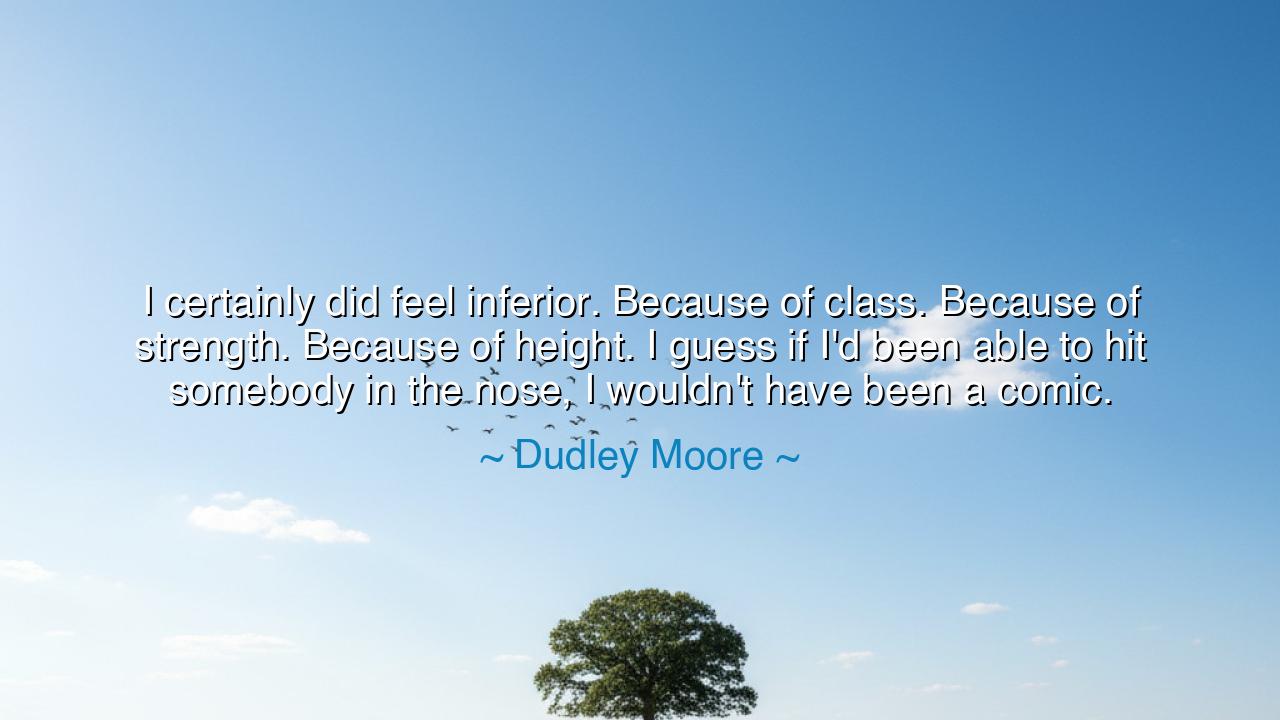
I certainly did feel inferior. Because of class. Because of
I certainly did feel inferior. Because of class. Because of strength. Because of height. I guess if I'd been able to hit somebody in the nose, I wouldn't have been a comic.






Hear the poignant confession of Dudley Moore, both jester and sage of the modern age: “I certainly did feel inferior. Because of class. Because of strength. Because of height. I guess if I'd been able to hit somebody in the nose, I wouldn't have been a comic.” In these words lies the story of how weakness, or what the world calls weakness, may be transformed into a gift. They speak to the wounds of youth, the shadows of inadequacy, and the strange alchemy by which pain is turned into laughter, and inferiority into art.
Moore admits the weight of class, that ancient divider of men. To be born outside the circles of wealth is often to feel like a stranger in one’s own land, measured and found wanting by standards never chosen. He felt also the absence of strength, that primal measure of manhood in a world that venerates the fist and the frame. And he felt the mark of height, that cruel reminder of nature’s inequalities. All these, he confesses, made him feel lesser in the eyes of others. Yet rather than surrender to bitterness, he took these burdens and forged them into a power all his own—the power of humor.
Here is the secret revealed: had Moore been able to strike with his fist, he may never have sharpened his wit. For when denied one form of strength, the soul seeks another. Unable to dominate with his body, he learned to move hearts with laughter. Many in history have walked this path: Demosthenes, the great orator of Greece, began as a stammering youth mocked for his weakness. By placing stones in his mouth and shouting above the waves, he turned frailty into mastery. What seemed a curse became his strength, remembered for centuries.
This truth echoes in the lives of countless others. Abraham Lincoln, awkward and often scorned in youth, found refuge in storytelling and humor, using them to win friendship and later to heal a divided nation. Charlie Chaplin, born into poverty and marked by loss, created a character that made the world laugh through its tears. So too did Dudley Moore, by acknowledging his feelings of inferiority, transmute them into a gift that reached millions. Thus, weakness became the root of power, and laughter the shield against despair.
Understand, O seeker, that what you call weakness may be the womb of your destiny. If you are denied the sword, you may be given the pen. If you are denied height, you may be given vision. If you are denied strength, you may be given resilience. The world often praises those who strike, but it is those who create, who transform their pain into beauty, who leave the deeper mark upon history.
Let this be your lesson: do not curse the places where you feel inferior. Examine them, wrestle with them, and see what hidden strengths they conceal. For the one who cannot hit with the fist may strike with the heart; the one who cannot tower with stature may tower with imagination. Your limitations may be the soil from which your unique greatness will grow.
Therefore, take action. Instead of longing to be what you are not, nurture what is already within you. Learn to turn your pain into art, your insecurity into empathy, your awkwardness into humor, your silence into wisdom. As Moore’s life shows, what once seemed to diminish you may be the very thing that lifts you to greatness.
Thus is the teaching: inferiority may be the forge of creativity, and weakness the mother of strength. Laugh where others would weep, rise where others would shrink, and you will find that what once made you small may one day make you great in the eyes of the world.






AAdministratorAdministrator
Welcome, honored guests. Please leave a comment, we will respond soon